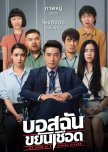
Neither funny nor thrilling
45 minutes in, and I noticed that I did not care about the serial killer. I did not care if he even existed or if it was [spoiler]. I did not care about the company's new marketing, I did not care about the three main characters.Ten minutes later, and I noticed that I did not care how the movie would end. So I stopped watching.
I admit, in the beginning, I did laugh a few times -- and then the jokes either were of the same category or I did not even notice them.
There was no tension, the "scary" scenes never were exciting, let alone thrilling.
Scenes were often too slow, or not contributing to the story -- why should I be interested in how they market their shirts(? I think they make shirts.)? And I say this as someone who has a high tolerance for slow pacing, if it's done with purpose.
Come on, there are excellent Thai comedies, and great Thai thrillers! You know how to do it!
Two good aspects:
* Three woman in main roles.
* Very good acting, especially of the Boss.
Esta resenha foi útil para você?

Esta resenha pode conter spoilers
How do romantic feelings change a friendship?
Living with Him is a slow-paced, slice-of-life, friends-to-strangers-to-roommates-to-lovers story. It's one of those very gentle J-BLs which are not so much about the story but more about the characters.The strength of this drama lies in how it is showing the dynamics of two childhood friends who are most comfortable together when they just live in the moment, don't think about what they are to each other, don't think about how others perceive them. As long as they are in their own world, everything is fine. It's when one of them starts to overthink things as well as when they think about what they are to each other that this closeness falls apart, and suddenly there's this chasm that they feel can't be overcome.
But they want to be near each other, so they try to find that balance, only to lose it again in the next moment. And this is what makes the drama interesting, not the plot but the change of distance in an evolving relationship.
The actors are quite good at showing this; unfortunately the story telling is quite different. It doesn't manage to build up the kind of tension the premise deserves, everything feels a bit flat. The scenes where Natsukawa and Kazuhito are very close to each other have the same overall feeling as those where there should be uncomfortable distance.
What also does not help is that Natsukawa is not a consistent character -- he says he is glad to be free of his obligations to his younger sisters but proceeds to fill exactly the same role in his new household with Kazuhito. And the question remains: After he realizes his feelings, what is holding him back? This is more than just the usual Japanese communication difficulties. Does he think he's not worth it? As the one who took care of two sisters for years, and seems to be mature beyond his age, his sense of self-worth shouldn't be that low. Does he have some internalized homophobia? Then it should have had more room than just that small scene.
In my opinion, a focus on one solidly developed inner obstacle and a consistent characterization for Natsukawa would have helped a lot.
The drama is worth watching for the change in distance romantic feelings can bring to a life-long friendship, just be aware that this is definitely not fast-paced, and much of what happens seems very mundane.
Esta resenha foi útil para você?

Esta resenha pode conter spoilers
During the first few episodes this series seemed a bit bland, but it picked up in the fourth episode.* The main couple are just adorable! I love how gentle they are with each other from the first moment they met until the very end. The progression from comfortable silences to learning how to express their emotions with each other was also really well done.
* The scond cuple was a bit ... weird at first, with the "bunny" and "owner" it gave uncomfortable vibes. Also, Phu playing hard to get took a bit too long. Overall, they have a similar progression, in that they have to learn how to give and take -- and not one only giving and the other taking.
* I hated the het romance, if you can even call it that. Starting from Khim, who ships real-life people and posts their photos online without asking for permission, and ending with Dr. Lies -- why two people have a crush on him, I'll never understand -- this whole storyline was a mess. It also didn't have anything to do with the others. Khim's illness was only there as long as it was usable for the plot. Overall, too much screentime for a (badly written) het romance -- there are already enough het romance series, I don't need them in my BLs. (Maybe as a very small side couple, but this here was too much.)
* I don't really get the father. I have no idea what he thought, and why he acted that way. They could have done a "Gui has to prove himself" subplot without a fiancée, and without that much pressure. It also changed the tone of the drama a lot. Instead of the het romance, it would have been much more interesting to develop this further.
* There are some smaller inconsistencies, but they can easily be overlooked.
* The cinematography was good though. At first I found it a bit beige-y and dull but it got better later.
* Also, the slow pacing of the first ten episodes was nice and appropriate for the development of the relationships. The music underlined this feeling.
Overall, I'm glad I picked this series up again (after dropping it last year after three episodes or so), but I probably won't watch it a second time.
Esta resenha foi útil para você?

Esta resenha pode conter spoilers
Very funny script, excellent comedic acting with impeccable timing and a serious message.
School meals are not just school meals.Eating is more than consuming nutrients.
Giving children food that will be good for them tomorrow, might not be the right thing for them today.
I love how teacher Amarida is so over-enthusiastic about his life passion -- and how nobody in the school bats an eye at his antics.
Ichihara Hayato's teacher is almost childlike in his joy about school meals. He dances in his seat in anticipation; his face, no, his *body* shows every emotion he feels while he's eating. Some call Ichihara's acting style pejoratively "over-acting" -- and if you do too, then you probably won't like this film much.
Like all of the great Japanese comedies, the film has an underlying message or two.
For the message Ichihara Hayato sees: "He loves what he loves and celebrates life no matter how much he's laughed at." (https://youtu.be/aOJa8KjDSA4?)
Maybe this film speaks to me more than to other people because I have been working in education in some way or other for the last 20 years, and I hear things that other people wouldn't. I hear a lot about what education should be.
If we take the "school meal" as the metaphor for the education we give to our children -- it's easy to see the parallels, right? -- they say "food for thought" in English and in German they say "das muss ich erst verdauen", if I get a hard/heavy piece of information, I'll have to digest it first.
We give the children "meals" that we think will be beneficial for them later -- which ingredients we choose, how we prepare them and how we present the meal, we should not only think of tomorrow's benefits but also if the children will even eat the meals joyfully. Why are the children who enter schools eager to learn at six years old -- why are most of those children apathetic to learning some years later? It's because we give children school "meals" that might be nutritious but don't give children joy when they consume them.
There was also a very poignant scene where a student tries to voice his opinion on the school meals in front of a whole room of powerful adults -- and not only do they not listen to him, they also laugh at him. The adult who are responsible for the children's well-being are not interested if the children are really happy. So, there's also this layer of meaning I can find in this comedy.
In conclusion, "School Meals Time Graduation" is what Japanese comedy can be when it's at its best -- very funny script, excellent comedic acting (if you like this style) with impeccable timing and a serious message.
Esta resenha foi útil para você?
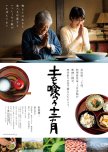
Esta resenha pode conter spoilers
I should have liked the film, I wanted to love it -- but there was one major thing that annoyed me so much I even dreamed about it the following night. I tried to keep this review spoiler-free anyway, but I don't think I managed.For the most part, the film just shows an old man (Tsutomu) gathering vegetables from the hill and from his field, cooking and eating them; and writing a book. Alongside this, we hear his thoughts about food, and about life -- his own life and how it shaped him specifically. In the film, what we hear is what Tsutomu is writing -- it's probably the essay the film is based on.
It's an interesting choice, to take an essay with Zen thoughts about life and try to turn it into a film -- and until the one hour mark, it works.
We see the season change, the landscapes and the vegetables change with them. Occasionally, the man's quiet life connects to the outside world -- a visit by his editor, by a carpenter, or when Tsutomu visits his mother-in-law.
I liked that part, I was looking forward to see the rest of the seasons. Even the motive of death, which was introduced at the end of the first hour, was fitting -- life and death are interconnected, which is why we like to eat together after a burial or a wake. I even liked the change of pace then, that death made Tsutomo's life more hectic -- that is a beautiful juxtaposition.
But after the scare he gets, his voice-over thoughts start to sound like those motivational quotes on greeting cards / calendars / facebook posts -- every single sentence has this feeling to it. This is no longer like the flow of thoughts of an old man, with some deep thoughts and some more personal observations, it's more like a compilation of "The Best of Zen" you could buy in the gift section of a book store.
I would have liked it much better if there had been more silence in this part of the film, only occasionally enhanced by a single sentence or thought.
Since this film is based on an essay, I suppose that everything we hear in the voice-over is from the essay, and that everything from the essay is in the film -- so unless either the film is longer or parts of the essay had been cut, there wasn't much else to do.
I'm also not too impressed with the relationship between the man and his editor -- is it friendship? Something romantic? It's implied that it's the latter, but the apparent age gap and some other smaller things make it strange.
Let's go back to the good things:
I loved the acting and the looks of the main character. Tsutomu is just an older man who is living his life. I like that he looks just like an ordinary man. With just a few changes in his movements, the actor shows us the change from the sprightly man who ambles through the woods and chases after pigeons to the elederly man who feels as if he's at death's door.
I also loved watching nature change from month to month -- and whenever I met the little frog again, I thought "Hello friend, there you are!" -- and also how the ingredients and the food preparation was filmed, which is something Japanese dramas or movies excel in.
And then, the last few minutes had everything I loved about the film, we also went full circle; but not quite -- as the year is complete, and things go back to the start, we'll have changed and the new year will be the same, and different.
Esta resenha foi útil para você?

The story:
* I like the cases, which usually take several episodes to solve. They are engaging, and it's easy to follow Su Wu Ming's and Lu Ling Feng's train of deductions -- until it isn't because the audience doesn't get all of the information in time, for a more surprising twist. Which I can live with, it's not as if other detective series haven't done this too.
* The cases are not solved quickly, it's a series that has quite a few red herrings, and solving the case is often enough helped by finding out motivations of the suspects.
* Usually, there are one or a few aspects in the cases that can't be explained rationally by Su Wu Ming, and seem a bit supernatural. I like that it's open to the audience's interpretation if it's truly supernatural or if the people of this era just don't have the knowledge.
* When things get dangerous, and there's fighting, then the scenes don't tend to be very long. I not able to say say much about the choreography, but it seemed solid. It found it interesting that Lu Ling Feng usually gets help if he knows that there will be a fight, and does not try to be heroic and take fights on his own, if he can avoid it. The most dangerous of enemies are usually taken down only because there's a communal effort.
* I love the banter between Lu Ling Feng and Su Wu Ming -- and how their relationship evolves so that they know what the other thinks just by looking at each other.
* While I loved the portrayal of the crown prince and the Princess, who were very ruthless and loyal to family at the same time, the nationalism was obnoxious, as usual in Chinese dramas. Seems that Tang (China) just can't do anything wrong; it's always only singular black sheep who have been led astray, never the system.
* The plot point about Lu Ling Feng's background was a bit contrived. But since they did not milk it too much (and also served a point both for the plot and for Lu Ling Feng's characterization), it was all right.
The romance:
* Is almost non-existant, but not completely. There are two couples, Pei Xi Jun / Lu Ling Feng and Sun Xue Ning / Su Wu Ming.
* The first couple is all right. I don't like (het) romance very much, so I'm usually very critical. But here, it works, in my opinion. Pei Xi Jun, yes, is completely infatuated in the first episodes, and a bit annoying about it. But that is toned down later on, to the point that there are almost no romantic interactions between them for most of the series. We get small interactions between the two young people though, that show that the attraction is definitely not one-sided, but it's more that Lu Ling Feng thinks he has more than enough reasons not to pursue anything with her.
* The second couple though. Oh man. That was definitely NOT needed in any way. It doesn't fit with the character of Su Wu Ming as we knew him until that started, and overall, it feels more like a "no homo"-type of romance than actual interest. Su Wu Ming was *very* close to Lu Ling Feng, so authors might have felt they had to counter that. That romance arc really diminished my enjoyment of the last episodes. Again, a forced het romance where it shouldn't be.
The characters:
* Su Wu Ming, the brains in this series, has little to no character development. He is, basically, the same intelligent and shrewd detective over the course of the drama. He feels very one-dimensional, and probably is supposed to be the good hero, who can do nothing wrong -- but I feel that there could have been more behind the facade of the humble genius that just wasn't explored.
* Lu Ling Feng, on the other hand, evolves from an arrogant, "hit first, talk later" general to a thoughtful gentleman with great potential as an official of the state. He is much more fleshed out than any of the other characters. That his actor is good looking also does help, I admit it.
* Pei Xi Jun could have been an annoying one-train-of-thought kind of girl. She wasn't. After the first few episodes, she calmed down a lot. She still stayed headstrong during the whole drama, following her goal of marrying Lu Ling Feng -- but she also knew where to push and where to retreat for a bit. She has grown up very sheltered, as a girl of noble birth, but still faces danger with a strong heart. Also, with her special skill, she was a valuable member of the group, without whom cases could not have been solved, not just a follower-on.
* Sun Xue Ning is a superfluous character, and it hurts to say that about a female character, because I'll always want more women in my dramas. But she doesn't bring anything to the group (we already have a fighter with Lu Ling Feng, and knowledge of poisons is covered by Fei), apart from being the romantic interest of Su Wu Ming. Her character is also the one where the typical macho tendencies show most -- she is both the fearless warrior woman and still has to be protected and shielded by the stronger men who try to send her away from danger "for her own good". Whenever there's a fight and both her and Lu Ling Feng are there, she is relegated to the side and has to protect the weaker characters. Oh, and also, in one fight, her clothes were torn so one of her shoulders was bared -- that has never happened to Lu Ling Feng. Strange, huh? And in this case, I don't care about historical accuracy. Either write your strong female fighter so she is equal to the men or don't write these characters at all.
* Another intriguing character is Master Fei ("Chicken Fed"). He brings the knowledge of the healing arts (and with it, the knowledge about anything poisonous) with him, as well as the much needed comedic relief. It's unfortunate that, even though we get to see part of his back story, his interesting past is never fully explored. Maybe in the second season?
* Xue Han was cute. Not much more to say. He had his bit of development, but remained a supporting character.
Overall, if you're there for intriguing mysteries and plots, then this is definitely a drama for you. If you are there for the romance or for cool fighting scenes, then not so much.
I admit, because of the misogynistic treatment of Sun Xue Ning, I won't rewatch it and probably also won't watch the second season.
Esta resenha foi útil para você?

Esta resenha pode conter spoilers
Forget it; I did.
This show is forgettable. And I mean this in the most literal way: I first watched this series some time the summer of 2022. When I came across the title again in the autumn of the same year, I had no idea what story this was supposed to be -- only during watching had I the feeling that I knew it somehow. And that happened again a few weeks later.I have no idea why the series was such that I forgot about it -- even after I watched it a fourth time. This is what could have contributed:
* The storylines are stereotypes -- friends to lovers / trusting a new relationship after a bad one / secret identities; they all seem to develop slowly but fast at the sam time? Maybe three couples was a bit much for 6x40 minutes. I am not even able to give a description of the stories (see above).
* The actors all look the same to me. Not only those who are brothers IRL, but also Chris and Ton Fah looked rather similar.
* The music was amazing in itself but made the whole show feel a bit dreamlike and apart from reality. I think a second soundtrack for the more dramatic and the emotionally heavy scenes would have helped.
* It feels as if there's a lot of backstory that we don't see, and there are also several inconsistencies.
All in all, I don't think I've made a connection to the characters in the series, maybe due to one of the points above, maybe not.
That said, the show is not bad, even mediocre is not the right word for it, it's just ... bland.
Esta resenha foi útil para você?

The tropes quickly come one after the other, and the whole drama is very fast-paced.
I loved all the side couples and the couples in the background. Also the parents really are the epitome of "mob"!
There is one, maybe a minor, point I did not like:
* I don't understand why "Mob" is so desperate to avoid a romance storyline -- I get it in the beginning, when he's reading about "Meriba"-endings, which I wouldn't like for me either, but after a while it just feels a bit homophobic, especially as he doesn't want his little brother to end up with a guy too! I wish we'd get a better explanation for that. As it is, the whole thing feels a little off for me especially regarding the ending, which kind of comes out of nowhere.
Recommended, if you need a laugh and if you know a lot of BL tropes.
Esta resenha foi útil para você?
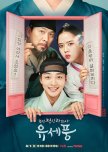
Yoo Se Poong, o Psiquiatra de Joseon
0 pessoas acharam esta resenha útil
Not really about psychological cases
I must say that the title and the first episode deceived me as to the content of this series.I thought that this would be a more light-hearted series with interesting cases, like the one in the first episode, cases that actually could be considered psychological.
Mostly, cases in following episodes were based in familial conflicts, poisoning etc. -- they also felt samey after a while.
I did not care for the court intrigue at all, and so I needed about two months to get through the second-to-last episode.
I also wished that we got to see more of Gye's family, I think the characters could have been really interesting but they remained rather one-dimensional. Overall, I enjoyed the interaction between the family members.
One last addition: The poisonous plant ("Dansacho") shown seemed to be Cyclamen, which is native to Europe and to the east up to Iran, NOT Korea. If it is, the symptoms are not what characters experience in the series. That fact makes me question the reliability of other medical practices in the show.
Esta resenha foi útil para você?

What I liked:
* The main lead's acting. I loved how he portrayed his character's emotional turmoil and, especially in the first half, his confusion about his feelings.
* I liked the pacing overall. There was a bit of a drag around the 2/3 mark, and the last episode felt rushed, but I really liked how the story, the parent's history and the love story, unfold.
* The action scenes were well done, and there was no excessive violence, only what was needed by the plot.
* I like the underlying message. Namely, that a free press (Free of politics and free of commercial restrictions) can be very powerful and that is why we need it.
* Something which I loved: At the beginning of each episode we were shown the last scene of the episode which came before -- which is not that new, but that scene always had something new, either just an extended version or the pint of view of another character, which sometimes even made me re-evaluate what I saw before. I don't think I've seen that done before, at least not that consistently.
What I did not like:
* Maybe I'm spoiled by dramas like "The Good Detective" or "Stove League", where there are multilayered characters and no clear line between good and bad, but I was disappointed by the "mystery", which was basically the "evil group who controls everything with an even more evil leader" trope. That trope is old and overdone, and I think audiences can and should expect more respect for their intelligence.
* I especially don't understand why they had to introduce a new plotpoint in the last two episodes. I'm sure they wanted to resolve the "item" and the murder of the first episode and maybe they wanted to finish with a bang, but it did not feel as an organic part of the rest.
* The female characters (apart from "Ajumma") also stayed remarkably passive during the whole show. The plot was mainly driven by Healer and the male reporter, while the young female reporter and the lady in the wheelchair usually followed behind, although both women's lives were equally, if not more, affected by the bad guys. Also, they are meant to be reporters! I expected them to take the lead at least in the later episodes.
All in all, it wasn't a bad watch but I'm not sure if it's worth a rewatch.
Esta resenha foi útil para você?

Esta resenha pode conter spoilers
This is so short, it was possible to watch it to the end, without getting tto annoyed.What I liked:
* Jang Eui Soo's (Chef Choi) acting. He did what he could with his script.
* The waiter and the sous chef were not just there but had their own characteristics, at least as much as they could within the short time.
What I did not like:
* Almost everything else. Examples:
* Empty scenery: Empty restaurant, empty beach, empty luna park... Where are the people?
* Overexposure does not make scenes romantic if there are no feelings. Same with montage + music.
* I think the main problem is that the script was faster than my emotions while watching. We have the rivalry / antagonistic beaviour in the beginning, that's okay. But when chef Choi acts like an arse during the first meeting and is shown to be the one who will maybe end Chef Yoon's employment, we, as the audience, need something to empathize with Chef Choi. We did not actually get it. I still don't know why Chef Yoon would fall in love with him.
* I have no idea why Laura (the restaurant's owner) wants to get rid of Chef Yoon. She says she wants to expand (he doesn't) but he's the one whose dishes people like?
* There's not enough restaurant and kitchen scenes -- show us how they work together, how they get closer doing their work.
* If the restaurant's so busy that Laura wants to expand, why are there no customers, why do the two main leads have enough time to hang around beaches and amusement parks and so on?
Both the world building and the relationship building is severely lacking in this movie. If I can empathize with the waiter and the sous chef more than with the couple, then something is very, very wrong.
It wasn't bad enough to stop me watching, but there wasn't anything to like it either.
Not recommended.
Esta resenha foi útil para você?
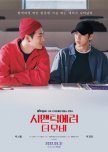
So, if you want to choose, I think the movie is a bit too long to watch it in one sitting (it's easier to find your place again in a series). Forthe series, I found the flashing light and the electric noise at the start of each episode grating, especially when I have a headache.
Things I liked:
* To do an "enemy-to-lovers-trope" is not easy. You can easily draw things out too long or have a power imbalance -- if the relationship reads more as "bullying" than as "mutual antagonism" it's really hard for me to understand how they would ever end up as lovers. (Looking at you, Make Our Days Count) But here, it ends relatively early, both give as good as they get -- and especially Jang Jae Young as the first instigator backs off when he realizes that he's crossed the line.
* I also loved Chu Sang Woo's character, which reads as somewhere on the autism spectrum for me. It's done better that in the original material, imo.
* The supporting characters were great in rounding out the story.
Things I did not like:
* I think I'd have liked to see the discussion about excavators and the subsequent drawing of one on Chu Sangwoo's arm (rather than the ugly veggie thing).
Overall, the pacing was good, and even if the general storyline was predictable (which is par for the course in romance dramas), the journey of both protagonists was lovely to follow.
Esta resenha foi útil para você?

A court / crime drama that combines serious cases with slapstick humour.
Does the combination of serious cases and humour work? Yes, for the most part.If you don't like the Japanese style of comedy and typical Japanese acting, then this show is probably not for you.
There are a few scenes when the slapstick comedy is a bit too much for me, but I thoroughly enjoyed the puns.
Things I liked:
* The cases are not too simple -- although the clues are usually quite obvious, it's not always clear on the details, so they stay interesting.
* This does not matter actually, since the main point of attraction are the lawyers and their team of paralegals and how they interact with each other.
* Especially Miyama and his "boss", Sada, who absolutely do not like each other at the beginning, start to respect each others strengths, even though their professional ethics differ.
* Regarding Miyama, the show manages to balance on the fine egde between making him eccentric and unlikeable -- usually landing on the side of eccentric. I think the humour in this show makes his quirks endearing rather than obnoxious.
* A huge plus is that there's no romance plot. Yes, there are two people with enormous crushes on another person, but these are only played for laughs, and it's very clear that the other party will never be interested.
One minor thing I did not like as much: The prosecutors' side stayed too one-dimensional; I would have liked more development for them.
Recommended!
Esta resenha foi útil para você?

You could probably understand most of what's happening without knowing the first season but I'd recommend watching season 1 first, as the regular customers are I introduced there.
The food, the acting, and the general atmosphere ware delightful again.
There are a few minor things that made me subtract half a point:
* I felt that in season 1 the customers interacted a bit more. The Izakaya felt emptier and not as lively. In season 1 it felt like a centre of a community.
* It felt like the food had less variety? I'm not sure why though.
* The hairstyle of some characters looked more anime-ish than in season 1.
* I missed the characters from before, especially Nikolaus. But I liked how they gently wrote most characters out and did not just let them disappear.
Overall, another mouth-watering, light and mostly fluffy series, a great watch if you just need a diversion from the Real World.
Esta resenha foi útil para você?

A drama about contemporary societal problems not only in South Korea
Topics in this court drama are sexism, corruption, greed, power imbalance and the question of how to make a just and lawful decision.I think as a European person, I probably was not able to understand the intricacies fully. South Korea is still young as a liberal democracy, but within an old, patriarchial and strictly hierarchical society. So, some themes, like how the old order between younger people (and people in lower status) and people with more seniority (higher status) clashes with a new system of ethics, where everyone is equal in front of the law, are things I will probably never really understand.
What I liked:
* I loved the team dynamics, and that every one of the recurring characters had their own personalities.
* The romance between the judge of court 43 and the secretary was cute. I liked that they both changed for the better during their courtship, and neither of them -- especially not the female character -- lost their core personality traits.
* The cases were, for the most part, interesting.
* It was also fascinating to see how the judicial system in S.Korea works. According to Wikipedia, the script (and the book it was based on) was written by a senior judge himself, so I don't expect there to be any glaring inaccuracies.
What I did not like:
* The last episodes were too cheesy for my taste. That happy ending felt too forced for me. Two main points:
* Especially the relationship between Ba Reun and Oh Reum could have remained platonic -- until the second to last episode, I loved their dynamic, and how they were learning to listen to the other. Sometimes love remains unrequited, and men and women can work together as nothing more than colleagues.
* They could also have left the story arc about NJ group more ambiguous. In real life, you don't have this kind of closure.
All in all, I don't regret watching it, although the last episodes made me change my rating of a solid 9 to a disappointed seven.
Esta resenha foi útil para você?

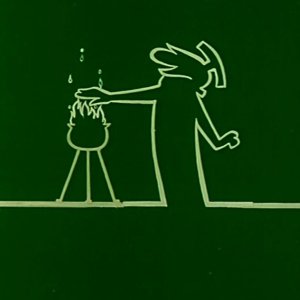
 3
3












